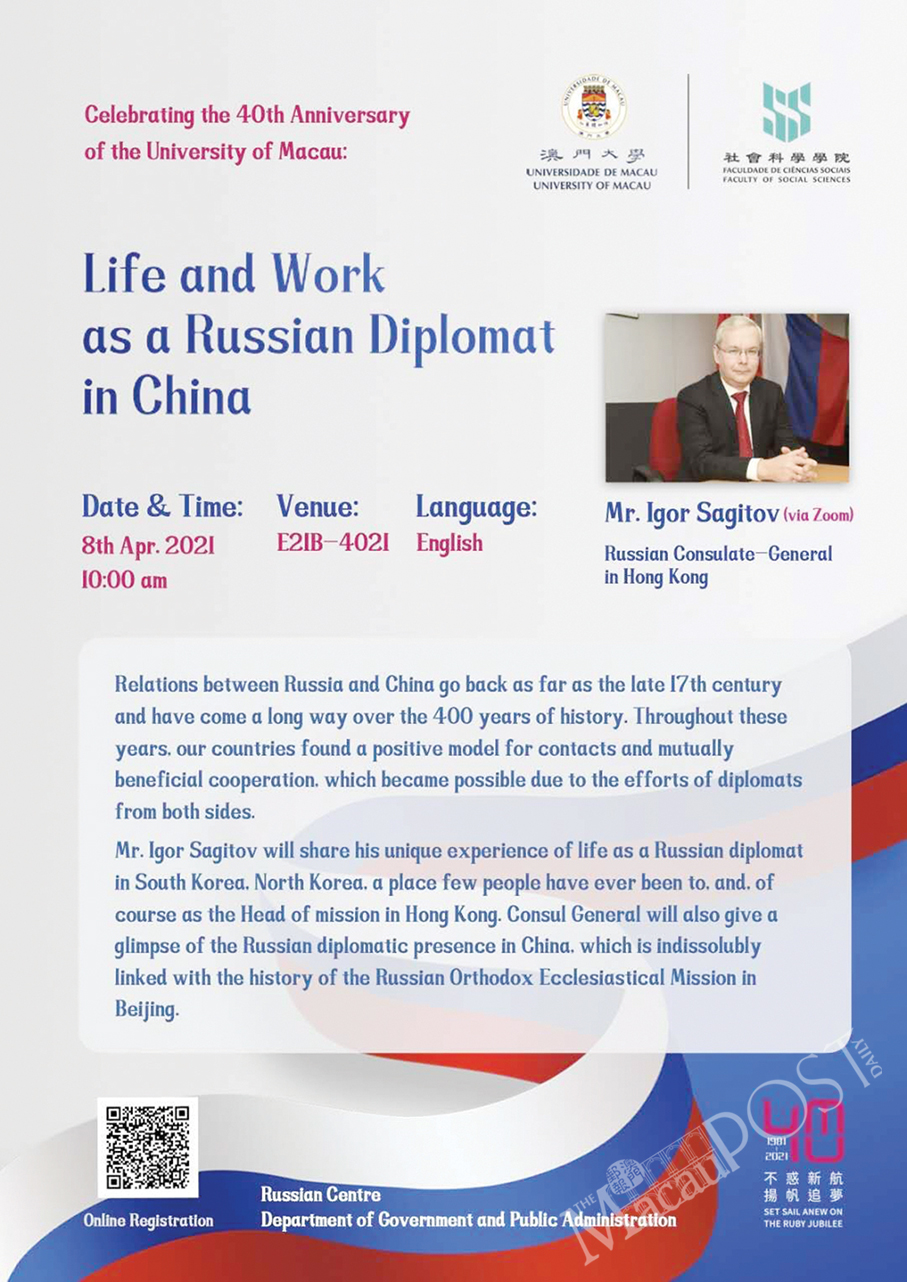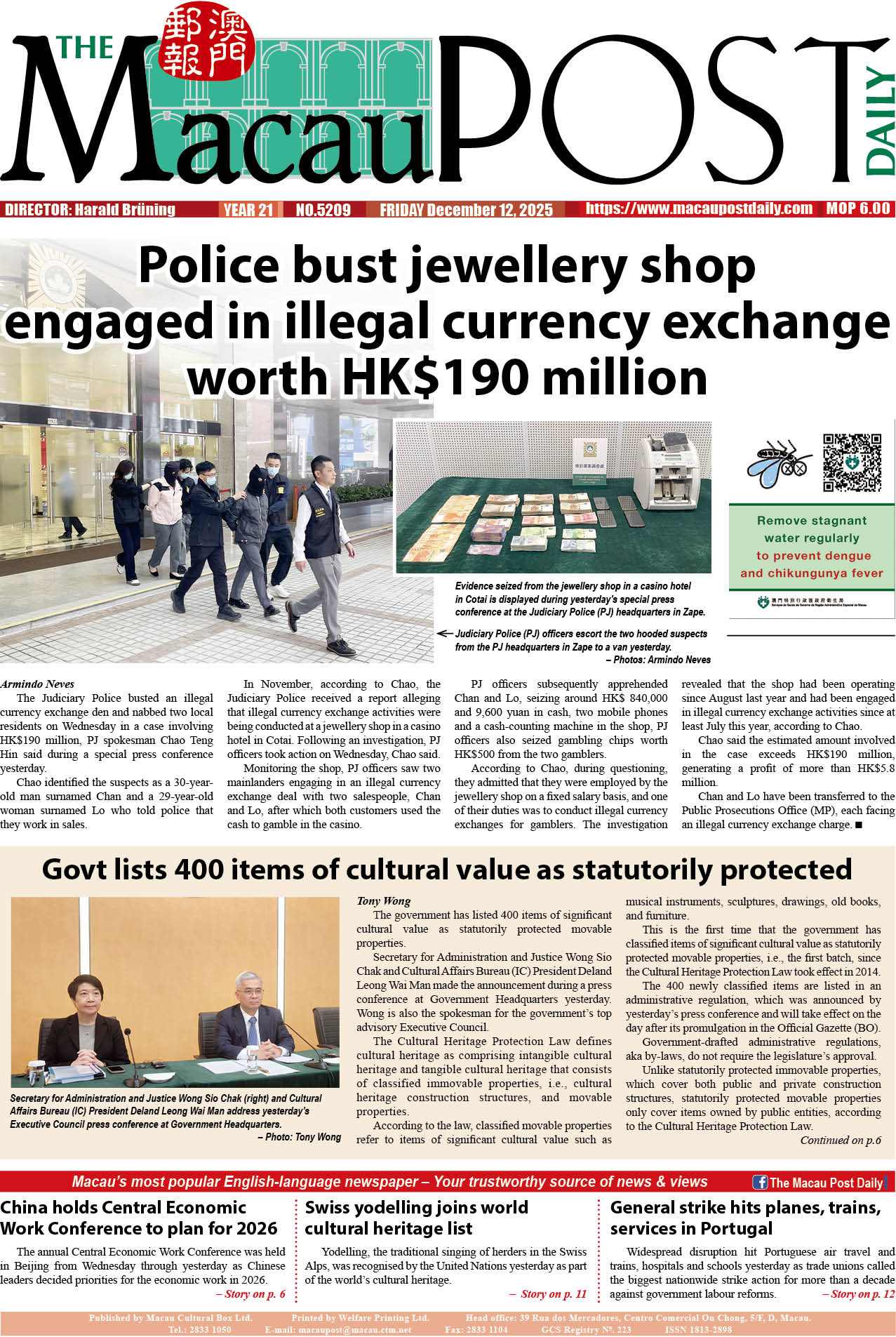Russkii Mir (Russian World) is the foundation organized by President Vladimir Putin in 2007 to set up, and run Russian Centers around the world. Russian Centers are modeled on the Chinese Confucius Centers, and are designed to promote the teaching of Russian language and culture at universities. As of today, there are over 100 Russian Centers on every continent, with seven in China, including Shanghai, Beijing, Dalian, Changchun, Xian, Taipei, Guangzhou and Macao.
The Russian Center in Macao first opened in November 2009, and was initially housed at the University of St. Joseph. Upon the encouragement and approval of Rector Wei Zhao, the Russian Center moved to the University of Macau. A formal agreement was signed between then Rector Wei Zhao and Vladimir Kochin, the Executive Director of Russkii Mir on October 22, 2014. The agreement allowed for the opening and operation of the Russian Center in Macao, and was automatically renewed in October 2019 for another five years.
Russian Centers have four purposes: 1. To promote the teaching of Russian language, history, politics, foreign relations, and culture through courses for both students and faculty at UM. 2. To host cultural and academic activities for the university for university faculty and students, as well as for the wider Macao community. These activities include: lectures, exhibitions, concerts, faculty and student exchanges, conferences, workshops, and films. 3. To serve as a resource center housing books, newspapers, magazines, computers, DVDs, and CDs for people to read, watch, and listen, as well as conduct research, as all computers are hooked up to the internet. 4. To serve as a place for people to gather, discuss what they have read and seen, and ask questions of Russian Center personnel.
The Russian Center in Macao would be very beneficial for the university campus for the following reasons: 1. The Center would raise the international profile of the university through its activities bringing scholars in Russian language and culture, and related fields, such as Sino-Russian relations to Macao. 2. The Center would establish academic ties between Russia and Macao. It would enable faculty and student exchanges, on both the undergraduate and the post-graduate levels. Those exchanges would increase diversity on the campus, which would raise the international academic rating of the institution. 3. While Russian-Chinese ties are already excellent as the two nations have a strategic partnership, the Center could only help improve the current ties. 4. The Russkii Mir Foundation could provide grants for UM faculty and students to conduct research and teaching projects.
The Russian Center in Macao officially re-opened on October 24, 2019. The new Russian Consul-General, Igor Sagitov, and his aide, Vice-Consul, Boris Erzdrin, attended. Mr. Sagitov gave a speech supporting the Russian Center. A week later, on October 29, Prof. Oscar Sanchez-Sibony, an Assistant Professor of Russian history at the University of Hong Kong, who formerly taught at the University of Macau, gave a talk on the intellectual and cultural roots of the 1917 Revolution. In early November, Prof. Michael Share was invited to the annual Assembly of Russkii Mir, held that year in Yaroslavl, Russia, where hundreds of personnel from Russian Centers all over the world attended. There he had the opportunity to exchange ideas to aid us in running our Center. As a result of discussions in Moscow, a number of further activities were planned for the academic year, 2019-2020.
However, due to the Covid-19 Pandemic that hit Macao in January 2020, the border to Hong Kong, and indeed to the entire outside world was soon closed. Its closure has impacted greatly on the Russian Center in Macao and its activities. The Russian Center had planned to hire a qualified and experienced Russian language and culture teacher to offer courses. The Center also planned to bring in speakers from Hong Kong to give lectures on a variety of topics during the past two years. Unfortunately, the Center has not been able to offer any courses, or bring in outside speakers due to the closure of the border with Hong Kong. Furthermore, the University of Macau and most offices were closed during much of the spring semester 2020, as courses were forced to go remote. As a result, the Russian Center did the best it could with very limited financial and personnel resources.
Last fall, on October 29, 2020, as the university began to return to a new normal, the Russian Center showed the Sergei Eisenstein classic silent film Oktyabyr (October) to a room that had as good an attendance as possible, given social distancing regulations. Given the fact, that the border between Hong Kong and Macao remains indefinitely closed, the Center decided to run a lecture-series utilizing the new technology Zoom. This way we are able to bring speakers from around-the-world at no extra cost. On April 8, Consul-General Sagitov gave a fascinating talk from the Consulate in Hong Kong on his life as a Russian Diplomat in China to a large audience of faculty and students. On April 16, in honor of Cosmonautics Day, commemorating that date in 1962, when Yuri Gagarin became the first person to go into Space, Prof. Joanna Radwanska-Williams from the MPI-Bell Center of English at Macao Polytechnic Institute, personally spoke on the Russian-American Space Race during the 1960s. Then on April 20, Prof. Oscar Sanchez-Sibony, returned via Zoom, and spoke on “Marxism and Bolshevik Visions of Utopia” to an audience of postgraduate and undergraduate students. On April 28, we showed another Sergei Eisenstein classic film, Alexander Nevsky,. Next week, on May 12, Prof. Vladislav Zubok, a full professor in International History at the London School of Economics, will speak to us from Moscow on his forthcoming book on the decline and fall of the Soviet Union, which is being released this summer. Prof. Zubok is one of the world’s leading authorities on the Cold War and recent Soviet history. Last, but not least, on June 7, Dr. Kirill Barsky, a senior official for the Asia-Pacific Economic Cooperation Forum (APEC), former Russian Ambassador to Thailand, and a Professor of International Relations at Russia’s leading International Relations University, will speak to us from Moscow on Russian-Chinese Relations. We are all looking forward to Dr. Barsky’s talk, which will close out our academic year at the Russian Center. We are also looking forward to a full fall program of events, when we hope the borders will, once again, be open. – UM









